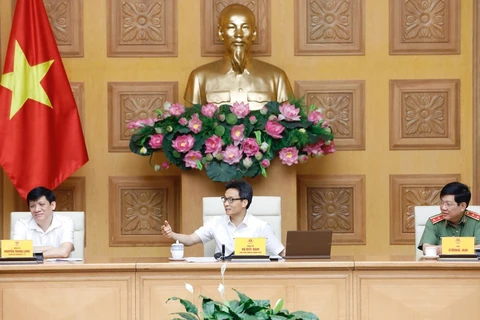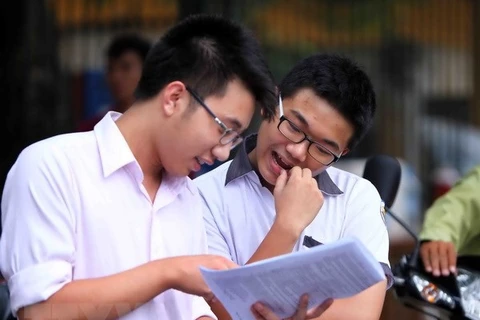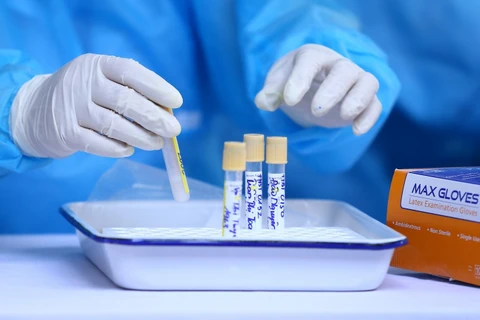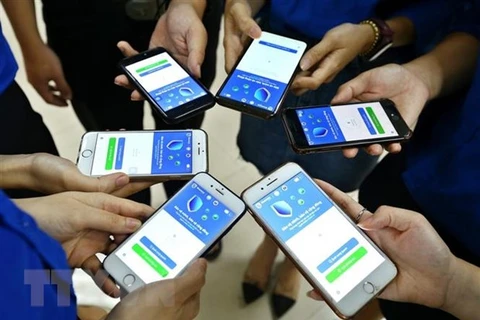 A person living in an area under lockdown at Ngo Quyen street, Hai Duong province, receives food on August 16 (Photo: VNA)
A person living in an area under lockdown at Ngo Quyen street, Hai Duong province, receives food on August 16 (Photo: VNA) Hanoi (VNA) – People in close contact with COVID-19 patients, referred to as F1s, could be potential patients. Tracing them is key to COVID-19 prevention.
To date, Vietnam reported a total of 964 infections, of which 336 were imported and quarantined upon arrival at airports. There were 628 locally-transmitted cases, including 488 relating to the outbreak in Da Nang that began on July 25.
Deputy head of the National Institute of Hygiene and Epidemiology Assoc. Prof. Tran Nhu Duong, who was also vice head of the Ministry of Health’s special taskforce in Da Nang city, spoke to a VietnamPlus’ reporter on recent efforts to repel COVID-19.
Reporter: As an expert in epidemiology, you have joined previous taskforces working in different outbreaks in Vinh Phuc and Binh Thuan. In your opinion, what are the most important measures in battling COVID-19?
Assoc. Prof. Tran Nhu Duong: There is neither a COVID-19 vaccine nor a specific medicine available at the moment. One of the most important measures is to stop the spread of the disease. In order to do this, the source of infection must be isolated so the SARS-CoV-2 virus that causes COVID-19 will not spread in the community.
This serves as a foundation for quarantining suspected COVID-19 cases, especially F1. They are people having direct contact within 2m with both confirmed and suspected cases, regardless of duration, and could be viewed potential patients.
Therefore, tracing new F1 cases once they are confirmed is key to COVID-19 prevention and control.
Vietnam’s current strategy in curbing community transmissions is to detect and quarantine. Monitoring and testing are essential to detecting COVID-19 cases, and tracing is important to detect F1s.
We spare no efforts in tracing F1 cases as fast as possible and make sure not to miss anyone. They have a high risk of being infected, so failure to promptly detect and quarantine F1 cases would let the virus spread like wildfire in the community.
 Assoc. Prof. Tran Nhu Duong (L) inspects a residential area in Da Nang where a COVID-19 case was previously reported (Photo: VNA)
Assoc. Prof. Tran Nhu Duong (L) inspects a residential area in Da Nang where a COVID-19 case was previously reported (Photo: VNA) Reporter: Can F1s self-quarantine at home?
Assoc. Prof. Tran Nhu Duong: The Ministry of Health (MoH) requires all F1s to go into concentrated quarantine facilities to be supervised by medical workers. They are not allowed to self-quarantine at home as it is difficult to control their movements. It is essential to keep a close watch on them.
Reporter: Do you have any recommendations for F1s staying in concentrated quarantine facilities?
Assoc. Prof. Tran Nhu Duong: The MoH has issued guidelines for people staying in concentrated quarantine facilities, including F1 cases. Those guidelines must be closely followed to prevent the spread of COVID-19 in such facilities.
As F1 cases are high-risk, their entry into quarantine sites, arrangement of accommodations and personal tools must comply with the guidance of the MoH and relevant agencies.
People staying in concentrated quarantine sites are also responsible for curbing the spread of COVID-19 at the facilities, not just relevant agencies and staff. They are asked to ensure safety for the sites by staying in their own rooms, not meeting anyone or being a part of crowds, and refraining from going out or talking with others.
Reporter: With your experience on the frontline, do you have any warnings for the people in the fight against the pandemic?
Assoc. Prof. Tran Nhu Duong: The Government has stated that we need to fight the pandemic like we’re fighting an enemy. This is the fight of all people, not just the health sector and authorities. People’s consensus is important as each family is deemed a fortress and each citizen is deemed a soldier.
People are advised to follow the health recommendations of the MoH, such as wearing masks in public places, washing hands regularly and making health declarations, among others.
F1s must strictly comply with regulations in concentrated quarantine facilities as it is both a right and duty.
I believe that people’s consensus is needed in this fight, and to bolster unity in an effort to repel the pandemic.
Reporter: Thank you so much!/.























